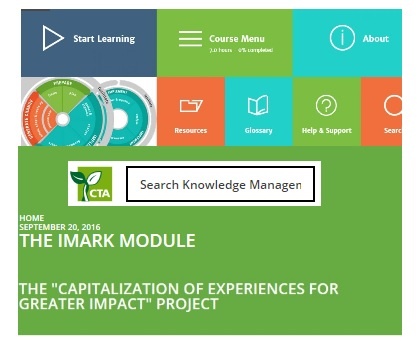Capitalization of Experiences for Greater Impact in Rural Development


The Capitalization of Experiences for Greater Impact in Rural Development project aims to facilitate the adoption of an experience capitalization process in rural development initiatives, where it can help improve the analysis, documentation, sharing, and the adoption and use of lessons and good practices – as an approach for continuous learning, improvement and scaling up.
___________________________________________________________________________________________________
The project is being implemented in different parts of the world by Technical Centre for Agricultural and Rural Cooperation (CTA), in collaboration with the Food and Agriculture Organization of the United nations (FAO) and the Inter-American Institute for Cooperation on Agriculture (IICA), with financial support from the International Fund for Agricultural Development (IFAD).
Building on the previous experiences of all organizations involved,
CTA wants to share the lessons drawn by many of the organisations, projects and programmes trying it out, and in this way encourage others to follow them – and benefit in the same way … |
and having a set of training materials
The IMARK learning module provides those working in development organizations with the tools and methodologies needed to work more effectively on the basis of their own experience.The different lessons present the conditions and requirements for such a process, and the necessary steps to follow... |
as a starting point, this project responds to the need to develop skills in non-governmental organizations, farmer organizations and development projects and programmes.
Individuals and organizations are being empowered with the tools and the skills to identify practices which can be brought to scale, to describe and analyse them in detail, and to share the lessons they learn.
Capitalization - How to go about it? ... this is seen as systematization, as an iterative process that helps identify specific innovations and practices, and understand the reasons behind success or failure: | |
to help provide evidence, and improve development interventions, thus also supporting advocacy efforts. | |
At the same time, the project works to create the necessary conditions so that an experience capitalization process becomes regular practice.
To tha end, the project looks at the necessary conditions for continuity (sensitizing key players, encouraging participants, demonstrating benefits) so that an experience capitalization process becomes regular practice, and focus on the need to institutionalize a knowledge management perspective within a development initiative.
In this context, an organisation can respond more quickly and more effectively to a crisis or to the changes that might arise.
The project also works to strengthen both intra- and inter-regional partnerships and collaboration.
DEVELOPING A TAXONOMY FOR AGRICULTURE AND RURAL DEVELOPMENT
In Agriculture and Rural Development (ARD) where activities greatly rely on knowledge generated from experience, individuals are seeing the value of structuring and grouping information as it makes it easier for retrieving and using.
A documented taxonomy approach, TAPipedia illustrates a process to developing a taxonomy (for structuring and grouping information) for Capacity Development (CD) for Agricultural Innovation Systems (AIS). The step by step approach is viewed through the lenses of Kathryn Breininger’s approach on developing taxonomies.
The Overseas Development Institute (ODI) stated in 2011 that taxonomies help in making knowledge ‘actionable’, that is usable.
In ARD, a multilingual thesaurus consisting of over 32,000 concepts with up to 40,000 terms in almost 30 languages called AGROVOC, was established by the Food and Agriculture Organization (FAO) of the United Nations. AGROVOC is indexed and tagged in specialised libraries, digital libraries and data repositories all around the world.
Sources:
___________________________________________________________________________________________________
Related:

